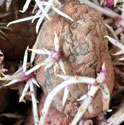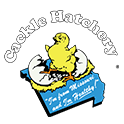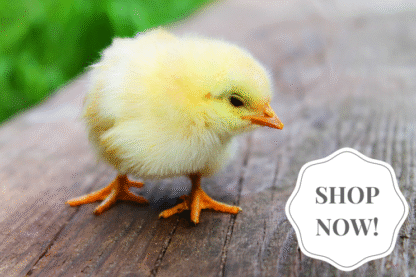
Chickens have a wide range of likes and dislikes when it comes to what they eat. Unless they don’t otherwise get enough to eat, most chickens won’t eat things that are bad for them, or at least they are unlikely to eat enough to make them sick. Feeding kitchen scraps can be a nutritious way to add variety to your chickens’ diet, but should be fed in moderation. Here are four types of kitchen scraps to avoid feeding your chickens:
- Avocado peels and pits, as well as leaves from avocado trees, contain the natural fungicide persin, which is highly toxic to birds. Avocado flesh is fine, if you are willing to share your guacamole with your chickens, but leave out the pits and peels. Signs of toxicity include labored breathing, increased heart rate, listlessness, or sudden death. That said, to become ill a chicken would have to eat a great many peels or pits — an extremely unlikely scenario.
- Onions contain sulfur compounds that break down into thiosulfinates, which in turn decompose into a number of disulfides — oxidizing agents that can cause red blood cells to rupture, resulting in hemolytic anemia. Garlic, too, contains thiosulfinates, but only in trace amounts compared to the much higher concentration in onions. Signs of onion toxicity in birds include diarrhea, loss of appetite, listlessness, paleness, difficulty breathing, and red-tinged urates. Whether the onions are raw or cooked makes no difference, and poisoning can occur whether a chicken eats a lot of onions all at once or small amounts over a long period of time. However, because the chicken’s body is continually replacing red blood cells, eating kitchen scraps that occasionally contain bits of onion poses no problem.
- Raw potatoes contain starches that don’t digest well. They also contain antinutrients — concentrated in the skin — that inhibit the activity of certain enzymes needed to break down proteins for digestion. A few scraps of raw potato or raw skins won’t harm your chickens, but too much at once can cause digestive discomfort. Cooked potatoes, on the other hand, are extremely nutritious, and any way you would cook potatoes to serve at your table is safe for your chickens.
The parts of a potato plant that grow above ground contain toxic alkaloids, the most problematic of which is the nerve toxin solanine. This bitter tasting alkaloid is concentrated in and directly under the skin and is not deactivated by cooking. Eaten by chickens in small amounts, solanine is poorly absorbed and rapidly excreted. But excessive amounts can cause diarrhea, paralysis, and death. Solanine toxicity is easily avoided by peeling off green parts of the skin and flesh, and removing any sprouting eyes, before cooking potatoes to feed your chickens (or yourself).
- Anything moldy or rotting can cause poisoning by botulism, one of the world’s most potent toxins. Birds can become poisoned after pecking at rotting organic matter or drinking contaminated water. The popular practice of hanging a rotting chunk of meat so maggots will fall into the chicken yard to provide the flock with a source of protein is an excellent way to poison the chickens. Feeding chickens a rotting head of unrefrigerated cabbage and letting them scratch in compost are other potential sources of poisoning. A typical indication of botulism poisoning is finding healthy chickens, sick chickens, and dead chickens all at the same time. Botulism in poultry is easily avoided through careful sanitation of feed and water.
Preventing problems caused by feeding chickens inappropriate kitchen scraps is primarily a matter of common sense. Don’t feed your chickens anything you wouldn’t eat yourself, and don’t feed them a whole lot of any single item, except of course for a properly formulated poultry ration.
And that’s today’s news from the Cackle Coop.
Gail Damerow, author, The Chicken Health Handbook



thank you for the info.